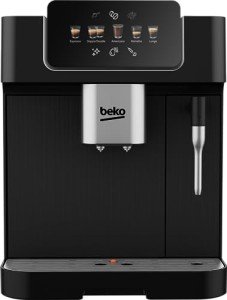20 Trailblazers Leading The Way In Bean To Cup Espresso Coffee Machine
Bean To Cup Espresso Coffee Machine: The Ultimate Guide
Over the last few years, the coffee culture has experienced a considerable transformation, with the rise of home developing gadgets supplying benefit and quality equivalent to coffee shop offerings. Among these gadgets, the Bean to Cup Espresso Coffee Machine stands out as a favorite amongst coffee lovers and casual drinkers alike. This extensive guide explores what these machines are, how they work, the benefits they provide, and aspects to consider when choosing the best one.
What is a Bean to Cup Espresso Coffee Machine?
A Bean to Cup Espresso Coffee Machine is a sophisticated coffee brewing gadget that grinds coffee beans fresh for each cup, automating the entire espresso-making process. These machines normally include built-in grinders, integrated milk frothers, and accurate brewing technology, allowing users to create high-quality espressos, lattes, cappuccinos, and more, all from the comfort of their homes. The convenience, matched with the abundant and robust flavors produced, has made these machines progressively popular.
How Does It Work?
The standard operation of a Bean to Cup Espresso Coffee Machine can be broken down into numerous essential steps:
Bean Grinding
- The machine grinds whole coffee beans immediately before developing, ensuring optimum freshness and taste retention.
Brewing
- Ground coffee is loaded into a filter, and warm water is required through the coffee premises at high pressure, which is vital for producing espresso.
Frothing (Optional)
- Many models consist of a steam wand or milk frother for preparing frothed milk for lattes and coffees.
Serving
- The last phase involves dispensing the brewed coffee into a cup, often with programmable features for customization.
Advantages of Bean to Cup Espresso Machines
Buying a Bean to Cup Espresso Coffee Machine offers many benefits, adding to its growing appeal.
Benefit
Description
Convenience
One-touch operation decreases the time and effort needed to prepare coffee.
Quality
Freshly ground beans lead to a richer, more delicious drink compared to pre-ground alternatives.
Personalization
Users can change settings to match personal choices, including grind size, coffee strength, and milk froth levels.
Cost-efficient
Although the preliminary financial investment might be high, cost savings on coffee purchases from cafés can be significant with time.
Adaptability
The capability to brew numerous coffee types, from espresso to cappuccino, widens the machine's appeal.
Key Features to Look For
When picking a Bean to Cup Espresso Coffee Machine, numerous features can affect the purchase choice. Below are essential elements to consider:
Grinder Type
- Burr mills are preferred over blade mills for their consistent grind size.
Brewing Pressure
- Search for machines that use a minimum of 15 bars of pressure for optimal espresso extraction.
Milk Frother
- Select between manual steam wands or automatic milk frothers based upon preferences for milk texture and foam.
User Interface
- An user-friendly control panel with programmable settings improves the general experience.
Size and Design
- Consider the countertop area readily available and pick a design that complements your kitchen area aesthetic appeals.
Maintenance Options
- Some machines provide automatic cleansing cycles, which can conserve effort and time in maintenance.
Popular Bean to Cup Espresso Machines
Picking a machine that fits one's needs can be challenging. Below is a list of popular designs, known for their reliability and efficiency.
Model
Secret Features
Rate Range
De'Longhi Magnifica ESAM3300
Adjustable coffee strength, compact style
₤ 550 – ₤ 700
Breville Barista Touch
Touchscreen controls, incorporated conical burr grinder
₤ 800 – ₤ 1,150
Saeco PicoBaristo
Automatic milk frother, 12 coffee specialties
₤ 900 – ₤ 1,300
Jura E8
Pulse Extraction Process, Alexa Compatible
₤ 1,800 – ₤ 2,500
Gaggia Anima
Easy to clean, programmable settings
₤ 500 – ₤ 800
Maintenance Tips
Keeping a Bean to Cup Espresso Coffee Machine in good condition is essential for ensuring durability and optimum performance. Here are some maintenance suggestions:
- Regular Cleaning: Clean the machine's parts frequently, consisting of the drip tray, coffee premises container, and water tank.
- Descaling: Perform descaling every couple of months based upon water firmness and usage to avoid mineral buildup.
- Modification Water Filter: If the machine has a water filtering system, alter the filter as recommended.
- Inspect Seals and Gaskets: Check for wear and tear to prevent leaks and make sure appropriate pressure throughout developing.
FAQs
1. Are Bean to Cup Espresso Machines simple to use?Yes, visit are developed for user benefit with simple control board and one-touch operation. 2. Can I utilize pre-ground coffee in these machines?While some machines enable the usage of pre-ground coffee, the main advantage depends on using whole beans for fresh grinding. 3. How typically ought to I clean my Bean to Cup machine?Regular upkeep is crucial; daily cleaning of detachable parts and descaling every 2-3 months are normally advised. 4. What is the average
lifespan of a Bean to Cup Espresso Coffee Machine?With proper maintenance, these machines can last anywhere from 5 to 15 years based on use quality
**. 5. Are these machines worth the investment?Though they can be costly, the benefit, quality coffee production, and long-term cost savings make them a deserving investment for many coffee lovers. Buying a Bean to Cup
Espresso Coffee Machine can significantly enhance the home
coffee experience. By offering freshly brewed, top quality coffee, these machines deal with the growing demand for café-style beverages in the convenience of one's kitchen area. With numerous choices on the marketplace, understanding features and personal preferences will aid in choosing the ideal machine to fit any coffee fan's needs.  **
**